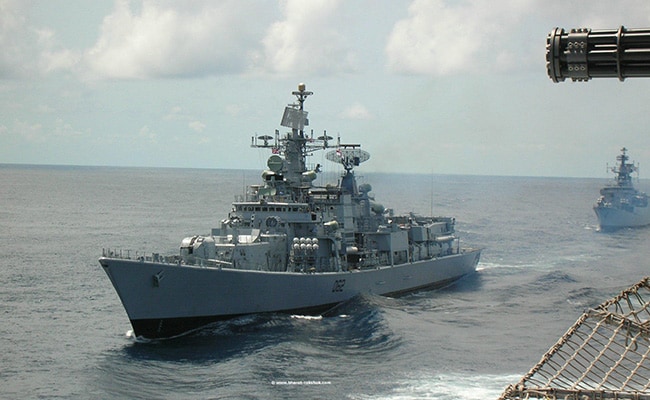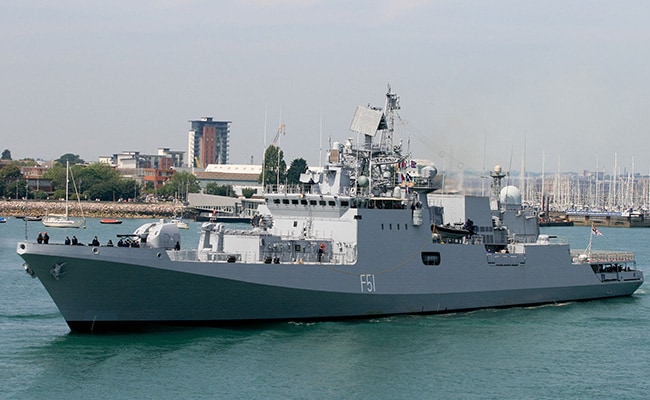
Brahmos missiles, shown being fired here, will arm next-generation warships.
New Delhi:
On a day when the Defence Minister Manohar Parrikar told Armed Forces commanders to focus on India's 'Look East' policy by stepping up joint exercises with friendly countries in South East Asia, details have emerged of plans to significantly expand the Navy's war-fighting capability.
On Saturday, the Defence Acquisition Committee of the Ministry of Defence is expected to review and clear proposals worth nearly Rs 29,000 crore for a host of new generation warships, upgrades and Naval fighting systems.
 Among the most significant, is a proposal to construct an all-new class of six next-generation missile boats in India, which, once completed, will be among the most powerful vessels of their class in the world. The 1,250-ton 'pocket battleships' are to be armed with Brahmos anti-shipping missiles which can strike targets at sea and on land 300 kilometres away.
Among the most significant, is a proposal to construct an all-new class of six next-generation missile boats in India, which, once completed, will be among the most powerful vessels of their class in the world. The 1,250-ton 'pocket battleships' are to be armed with Brahmos anti-shipping missiles which can strike targets at sea and on land 300 kilometres away.
The boats, which will replace the Navy's ageing Prabal class missile-boats, will also be equipped with surface to air missiles, close-in-weapon-systems to intercept hostile missiles, a main gun and point defence guns to counter threats, potentially from terrorists operating in small fast boats. They will be built in India and with the project likely to cost Rs 13,000 crores.
 Heavily armed for their size, the missile boats follow a recent trend of modern Navies building a new generation of small missile armed ships. In October last year, the Russian Navy launched 26 missiles from four small frigates and corvettes in the Caspian Sea to strike ISIS targets more than 1,500 kilometres away.
Heavily armed for their size, the missile boats follow a recent trend of modern Navies building a new generation of small missile armed ships. In October last year, the Russian Navy launched 26 missiles from four small frigates and corvettes in the Caspian Sea to strike ISIS targets more than 1,500 kilometres away.
The Indian Navy, for its part, has long favoured small missile boats. In the 1971 war against Pakistan, an Indian variant of the 245 ton Russian designed Osa class missile boats caused widespread destruction on Pakistani shipping in and around Karachi harbour in the first use of anti-ship missiles in combat in the region. This was only the second time in Naval warfare that anti-ship missiles had been used successfully in combat. So successful was Operation Trident as it was known, that the Navy celebrates Navy Day every year on December 4 to mark the occasion.
Other than missile boats, the Navy is set to significantly upgrade its legacy Delhi class destroyers and the relatively new Talwar class frigates with the made-in-India Brahmos missile, significantly expanding their offensive firepower. The existing weaponry of less-capable Klub anti-ship missiles which currently equip the Delhi and Talwar class may be transferred to older warships though these plans are still being finalised. The deal to upgrade these warships will cost 2700 crores which will include the entire Brahmos missile complex including practice missile rounds.
Significantly, the Navy wants to upgrade its ability to carry out clandestine operations by its Marine Commandos who will now be equipped with two Special Operations Vehicles (SOV), essentially mini-submarines, to be built at Hindustan Shipyards Limited in Visakhapatnam. Each SOV will embark three swimmer delivery vehicles (SDV) to be used by specialist divers in commando operations. This project is worth Rs 2000 crores.
As part of its overall blue-water plans, the Navy sees fleet support ships as an essential force-multiplier giving it the ability to operate far away from Indian shores. To this end, Hindustan Shipyards Limited and Hyundai Heavy Industries of South Korea have been in talks for the construction of five Fleet Support Ships in India worth Rs 9000 crores. It is unclear at this stage if the deal will involve a government to government deal between India and South Korea or will be negotiated between the two companies involved.
Finally, the Navy plans to acquire five diving support craft in a Make-in-India proposal for 150 crores to replace its elderly vessels.
Naval ship-building is an area of strength in India and the biggest success-story of this government's Make in India plans in the defence sector. For decades India has been designing and manufacturing the ships it needs from its own aircraft carriers to nuclear submarines.
On Saturday, the Defence Acquisition Committee of the Ministry of Defence is expected to review and clear proposals worth nearly Rs 29,000 crore for a host of new generation warships, upgrades and Naval fighting systems.

Delhi Class destroyers will also be armed with the Brahmos anti-ship missiles.
The boats, which will replace the Navy's ageing Prabal class missile-boats, will also be equipped with surface to air missiles, close-in-weapon-systems to intercept hostile missiles, a main gun and point defence guns to counter threats, potentially from terrorists operating in small fast boats. They will be built in India and with the project likely to cost Rs 13,000 crores.

Talwar Class frigates of the Indian Navy will also be upgraded.
The Indian Navy, for its part, has long favoured small missile boats. In the 1971 war against Pakistan, an Indian variant of the 245 ton Russian designed Osa class missile boats caused widespread destruction on Pakistani shipping in and around Karachi harbour in the first use of anti-ship missiles in combat in the region. This was only the second time in Naval warfare that anti-ship missiles had been used successfully in combat. So successful was Operation Trident as it was known, that the Navy celebrates Navy Day every year on December 4 to mark the occasion.
Other than missile boats, the Navy is set to significantly upgrade its legacy Delhi class destroyers and the relatively new Talwar class frigates with the made-in-India Brahmos missile, significantly expanding their offensive firepower. The existing weaponry of less-capable Klub anti-ship missiles which currently equip the Delhi and Talwar class may be transferred to older warships though these plans are still being finalised. The deal to upgrade these warships will cost 2700 crores which will include the entire Brahmos missile complex including practice missile rounds.
Significantly, the Navy wants to upgrade its ability to carry out clandestine operations by its Marine Commandos who will now be equipped with two Special Operations Vehicles (SOV), essentially mini-submarines, to be built at Hindustan Shipyards Limited in Visakhapatnam. Each SOV will embark three swimmer delivery vehicles (SDV) to be used by specialist divers in commando operations. This project is worth Rs 2000 crores.
As part of its overall blue-water plans, the Navy sees fleet support ships as an essential force-multiplier giving it the ability to operate far away from Indian shores. To this end, Hindustan Shipyards Limited and Hyundai Heavy Industries of South Korea have been in talks for the construction of five Fleet Support Ships in India worth Rs 9000 crores. It is unclear at this stage if the deal will involve a government to government deal between India and South Korea or will be negotiated between the two companies involved.
Finally, the Navy plans to acquire five diving support craft in a Make-in-India proposal for 150 crores to replace its elderly vessels.
Naval ship-building is an area of strength in India and the biggest success-story of this government's Make in India plans in the defence sector. For decades India has been designing and manufacturing the ships it needs from its own aircraft carriers to nuclear submarines.
Track Latest News Live on NDTV.com and get news updates from India and around the world

